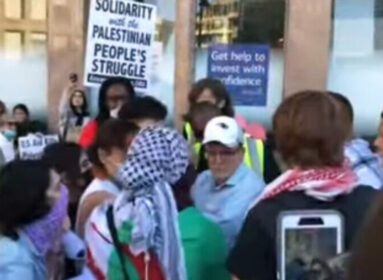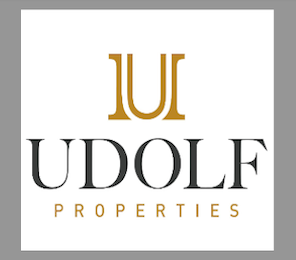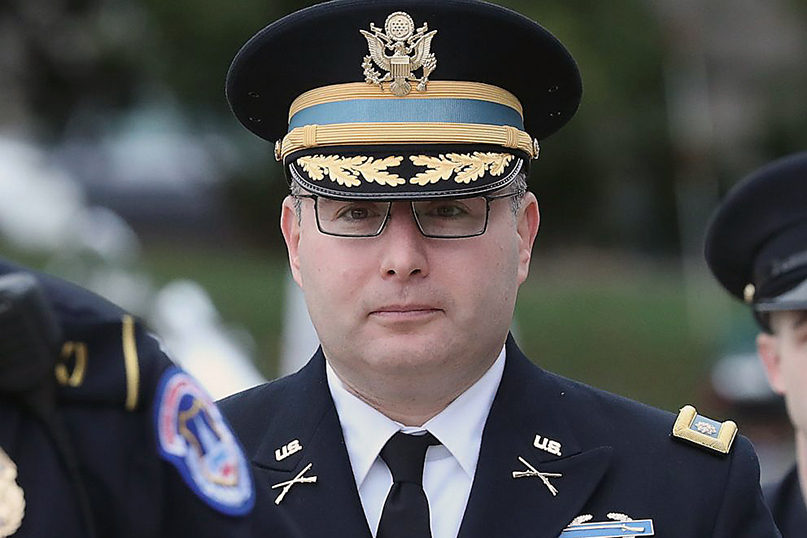
By Maxim Matusevich
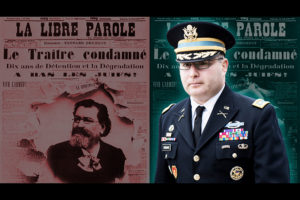
Lt. Col. Alexander Vindman arrives at the Capitol for his deposition as part of the House’s impeachment inquiry, Oct. 29, 2019. (Bill Clark/CQ-Roll Call, Inc via Getty Images); Headline from La Libre Parol on the Dreyfus affair: “The Traitor Convicted,” “Down with the Jews!” (Wikimedia Commons)
(JTA) – On Jan. 13, 1898, the French novelist Emile Zola published an open letter titled “J’Accuse!” in which he called out the antisemitism of the French government and France’s military establishment.
Zola demanded justice for Capt. Alfred Dreyfus, a Frenchman of Jewish descent who was accused by the military of being a German spy, and subsequently suffered imprisonment and public humiliation. Throughout the so-called Dreyfus Affair, the French public remained split between those who believed in the captain’s honor and honesty and those who stuck to the age-old prejudice that a Jew can never be trusted, especially on matters of national security.
Suspicions of dual loyalty and treachery have followed the Jews over the centuries along the path of their migration and exile – from North Africa to Spain, from Spain to France and Germany, from Germany to the Russian Empire and beyond. Those of us who hail from the former Soviet Union know all too well what such suspicions often entail.
Lt. Col. Alexander Vindman is a naturalized U.S. citizen, whose family emigrated from the Soviet Union when he was still a toddler. A decorated army veteran and White House official, he was one of the aides listening in on President Donald Trump’s phone call with Volodymyr Zelensky, in which Trump asked the Ukrainian president to investigate former Vice President Joe Biden. And now, as a result of his congressional testimony, Vindman enjoys the dubious distinction of being just the latest Jew in history to be accused of dual loyalty by political enemies.
In an Oct. 28 Fox News panel, host Laura Ingraham and guest John Yoo launched into a freewheeling attack on Vindman, entertaining the idea that he could be guilty of espionage. On Oct. 29, former GOP Rep. Sean Duffy told CNN’s John Berman that Vindman seems to be more concerned with Ukraine’s military defense than with America’s foreign policy interests.
Many Democrats and Republicans swiftly and strongly spoke out against this vilification of an American patriot. But as praiseworthy as these condemnations were, Jewish Americans – regardless of their political affiliations – should understand the added danger of the smear campaign against Vindman: It not only represents an attack against immigrants, but fuels contemporary antisemities looking to breathe new life into tropes of Jewish dual loyalty.
In April 1945, my great-uncle Aaron, a Red Army colonel, led his artillery division in the storming of Berlin. After the triumphant battle, most of the participating colonels were promoted to the rank of general. Aaron was denied the promotion because he was Jewish. Jewish generals were a rarity in the postwar Soviet military – Jews could not be trusted.
At the height of Stalin’s postwar antisemitic campaign and on the eve of the infamous “Doctors’ Plot,” my father, a young aspiring engineer, was suddenly fired from his job and denied employment until after the tyrant’s death; his duties were deemed too sensitive to be trusted to a Jew. He barely survived on his tiny disability pension and the experience, which included an expectation of imminent arrest, scarred him for life.
My own experiences during the waning years of the Soviet empire were far less dramatic, but the feeling of being an outsider, someone whose loyalty could be questioned and right to belong revoked, was certainly part of it. I’ll never forget passing the newspaper stands on my daily walks to and from school. The newspapers decried the evils of Zionism and depicted nefarious-looking hook-nosed creatures who were plotting to spoil the party of “progress-loving humanity.” The creatures’ noses looked like mine.
Hundreds of thousands of Soviet Jews arrived in the United States during the Soviet Union’s last two decades, and it seems fair to suggest that most of them liked what they found in this country. They were now free to be Jews without any apparent stigma attached to their identity. Their politics tended to be rooted in the unequivocal rejection both of the Soviet past and of any political movement deemed or imagined by them to be aligned with the abandoned empire.
Transplanted to U.S. soil and, for the first time in their lives, faced with political choices, many of them discovered that they were conservative. They became proud and loyal U.S. citizens and often voted for those who shared their distaste for “socialism” and their passionate attachment to Israel. They hardly saw themselves as Russian or Ukrainian or Moldovan but rather as Russian-speaking Jews who emigrated from the Soviet Union. Which is not to say that they had no affinity for Russian culture and language–many of them did, and sometimes with vengeance.
There is no person in the United States who should be able to understand the nuances of Soviet Jewish identity and the trauma underlying the Jewish experience in the former Soviet Union better than Alan Dershowitz.
For decades, he has been a figure of admiration among former Soviet Jews. A close friend of the legendary refusenik Natan Sharansky, Dershowitz was one of the most active and influential figures in the movement to free Soviet Jewry.
That is why it was so shocking and disappointing to see the prominent Harvard Law professor stay silent during the now infamous Fox News panel and Ingraham and Woo’s free-wheeling defamation of Vindman. I could not wrap my mind around the uncomfortable fact that someone who had done so much for so many Soviet Jews could sit calmly while the loyalty and integrity of one such Jewish immigrant was being questioned by those who are not worthy of approaching his record of service and excellence.
Thankfully, Dershowitz did eventually speak. In an October 30 opinion piece for the NY Daily News, Dershowitz wrote that he remained silent because he “had never heard of Vindman and had no idea why he was being attacked,” adding that after he “looked up Vindman and found out that he was a great patriot, an American military hero and an immigrant from the Ukraine,” [he] immediately tweeted, “I don’t believe that Vindman is guilty of espionage or other crimes…Vindman is a patriot who served his country. I’ve long opposed the criminalization of political differences.”
In his opinion piece, Dershowitz added that “the unfortunate attack on Vindman is a symptom of a deep malignancy which threatens our body politic.”
John Woo has since backpedaled as well, writing in USA Today that he has “no reason to question Vindman’s patriotism or loyalty to the United States,” but that he “thought the Ukrainian contacts sounded like an espionage operation by the Ukrainians.”
Those who subscribe to the clichés of the American success story would be hard-pressed not to admire Alexander Vindman’s American odyssey. Yet the moment Vindman resolved to uphold his oath and testify about the apparent malfeasance he observed within the Trump administration, the proverbial gloves came off and the friendly masks fell.
By all available accounts, Vindman is a profile in courage and civil service par excellence, a military man and self-effacing but efficient civil servant. He was also part of the third immigration wave that washed thousands of Soviet Jews onto American shores during the late 1970s and early 1980s.
As was typical of that cohort, he grew up an American patriot, which was not all that difficult considering that his family moved to the United States from Soviet Kyiv when Vindman was three years old. While most Soviet Jewish immigrants encouraged their children to follow predictable and safe career paths (medicine, engineering, computer science, law, etc.), the Vindman boys dedicated their professional lives to the military and civil service.
Even if it was not Ingraham’s intention, in the Fox News segment, this wounded war vet and a recipient of the Purple Heart ceased to be an American patriot and became, in the words of Zola (and the ears of today’s antisemites), a “dirty Jew.”
“It is a crime,” Zola wrote in “J’Accuse,” “to poison the minds of the meek and the humble, to stoke the passions of reactionism and intolerance, by appealing to that odious antisemitism …”
Are the attacks on Vindman just another case of the ends justifying the means? The joy of being close to power? The attractions of contrarianism?
As a historian, I believe in our ability to connect with the past. I can easily imagine Alan Dershowitz transported to Paris in 1906 and meeting Alfred Dreyfus soon after his exoneration. I see the two of them taking an unhurried walk together along the Seine. It seems to me they would have a lot to discuss.
Maxim Matusevich is the director of the Russian and East European Studies Program at Seton Hall University.
A Jewish photographer has been capturing the Vindman twins for decades
By Josefin Dolsten
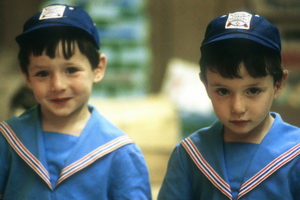
Carol Kitman first started photographing Yevgeny, left, and Alexander Vindman in 1980. (Carol Kitman)
(JTA) – Carol Kitman remembers meeting Alexander and Yevgeny Vindman nearly 40 years ago in the Brighton Beach section of Brooklyn, New York. The brothers were about four-and-a-half years old and dressed in matching blue sailor outfits with navy caps.
Kitman was instantly taken with the twins and asked to take their photo.
“They were adorable,” she recalled.
Those photos became the first of many she would take of the Vindmans. Now her work has unexpectedly come into the spotlight after Alexander Vindman told Congress last month that he believed President Donald Trump attempted to withhold aid to Ukraine to force the country to investigate former Vice President Joe Biden.
A decorated Iraq War veteran and Ukraine expert on the National Security Council, Vindman, 44, was listening in on the phone call between Trump and Ukrainian President Volodymyr Zelensky that launched the impeachment inquiry now underway. His testimony made him a target of attack by the president, who called him a “Never Trumper” and warned that new information about Vindman would be revealed “very soon.”
Kitman, now 89, says she is “not a political wonk,” but described the brothers as “very upstanding people.”
“Alex is exactly who he says he is and it’s really unfortunate that people are trying to defend Trump by attacking him,” she told the JTA by phone from her home in Leonia, New Jersey.
A photographer who specializes in portraiture and new immigrants, Kitman grew close with the Vindmans after that first meeting on the beach in 1980, and she began regularly shooting the twins and their older brother, Leonid. At one point, she was traveling to their home almost every weekend to take their picture.
The Vindmans – the twins, their older brother, their father and grandmother – had left their native Ukraine for the United States just a year before they met Kitman. Their mother had died in Ukraine shortly before. Like many Jews who arrived in New York from the former Soviet Union, they settled in Brighton Beach, nicknamed “Little Odessa.”
“We came from Russia. We came from Kyiv. And then our mother died, so we went to Italy. Then we came here,” the twins say in a 1985 Ken Burns documentary about immigrants. The twins were also models in a book Kitman co-authored called One Mezuzah: A Jewish Counting Book, which used Jewish images to help teach counting.
As children, the Vindmans looked identical, and Kitman could only tell them apart by a freckle on Alexander’s nose.
As Kitman photographed the twins, she drew close to the family.
“I was at everybody’s wedding, and I was always treated very nicely, like an old relative, because I had in some way introduced them to another aspect of American life outside Brighton Beach,” Kitman said. “We lived in the suburbs in a house, and they were in a little tiny apartment in Brighton Beach.”
Over time, she saw the Vindmans less frequently, but still photographed them at special occasions, including each of the brothers’ weddings. Both twins married women with Native American ancestry.
“When Alex got married, even though his wife is not Jewish, they had a tallis over them, which is often at Jewish weddings,” she said. “And he was able to find an Army rabbi who was willing to marry them.”
Last year, Kitman and her husband attended the Pentagon ceremony where Yevgeny, who also goes by Eugene, was promoted to the rank of lieutenant colonel. Like his brother, Yevgeny also serves on the National Security Council and reportedly accompanied Alexander as he reported concerns about the phone call with Zelensky to a White House lawyer.
Kitman had been drawn to the Vindmans because of their immigration story. At the time, she had been considering doing a photography book about immigrant children.
“My mother was brought here also at three or four, and her mother had died back in Bialystok, Poland,” Kitman said. “So their having lost their mother really resonated.”
As for their Jewish identity, Kitman said that the twins find their way to connect.








 Southern New England Jewish Ledger
Southern New England Jewish Ledger